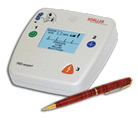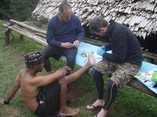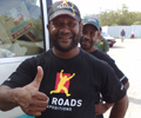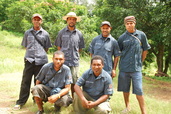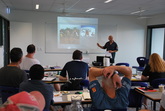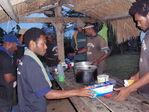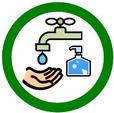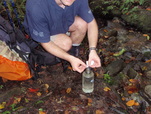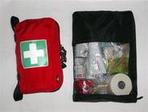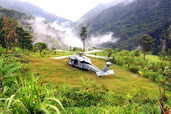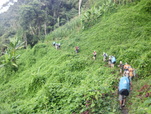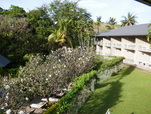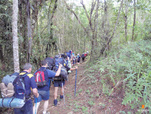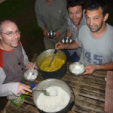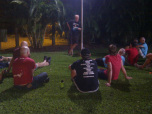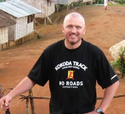|
No Roads Expeditions have been operating along the Kokoda Track since 2003, utilising the experience and knowledge from managing and offering over 60 expeditions, in 16 countries with activities including sailing, sea kayaking, mountaineering, trekking, diving, cycling, rafting and survival adventures.
The Kokoda Track is set in a remote region of Papua New Guinea. There are very few medical facilities, there are no roads that vehicles can travel on, and there is limited radio contact along the Track. In light of this challenging trekking environment No Roads Expeditions have developed and implemented a range of innovative risk mitigation procedures that address every eventuality that we believe could occur while trekking the Kokoda Track. Kokoda trekking can be a safe and rewarding experience. We have strong partnerships with a secure hotel in Port Moresby and pre-arrange all transport, and we continue to enjoy an extremely positive and friendly relationship with all the communities along the track, in particular with the village of Kagi roughly half-way along the track. The No Roads team of PNG Guides are experts in living in a jungle environment and are very familiar with every aspect of the Kokoda Track. They have a tradition of helping Australians through their land and they are very proud of this tradition. As a matter of fact, many of our guide team are the grandsons of the famous Fuzzy Wuzzy Angels who so wonderfully fought alongside and cared for the Diggers during the WW2 Kokoda campaign. There are no wild dogs on Kokoda, there are no cannibals, and there is no poison ivy as incorrectly stated by some media outlets. Although we take you through a safety briefing about preventative measures you should take to minimise chances of becoming injured, there is always a risk that you could slip and seriously hurt yourself on the tough terrain. This applies to even the most experienced hikers. |
Drew Gordon on Expedition Safety and Security
PNG Operations Manager - Terrance David
|
How Do We Keep You Safe?
No Roads Expeditions have developed and implemented a range of innovative risk mitigation procedures for Kokoda Track expeditions as outlined below.
|
Satellite Phone Contact
No Roads uses Iridium Satellite phones on all expeditions. This allows us to communicate with Port Moresby and Australia in case of an emergency. We also carry a spare battery. |
We Carry an AED
On all Australian led Kokoda expeditions our leader carries an Automatic External Defibrillator (AED) for cardiac arrest emergencies in addition to the wilderness first aid kit. |
|
Wilderness First Aid Kit
Our expedition leader carries a comprehensive wilderness first aid kit for emergency situations supporting any medical emergency evacuations that may be needed. |
Trained for Emergencies
The majority of our expedition guides have extensive experience in emergency management as officers in the Fire, Police, SES, Army, Ambulance services across Australia. |
|
Water Crossing Safety
Our expedition team establish water crossing safety protocols for all trekkers and construct a river rescue system as a backup. Trekkers unstrap and remove backpacks on all dangerous water crossings. |
Trekker Hydration
All trekkers are provided with electrolyte replacement powder and hearty meals that replace minerals lost during sweating. A waterproof "Hydration and Hygiene Guidelines" card is also issued to all trekkers. |
|
Kokoda Operations Team
We have dedicated operations personnel in Australia and Port Moresby to coordinate expeditions and emergencies, including access to an Australian Doctor by satellite phone. |
Experienced Local Team
Our local expedition team are very experienced and live directly on the Kokoda Track, mostly from the Kagi village. They are experts on the terrain, politics, weather, culture and the environment. |
|
Regular Training for Guides
Our Australian and Local PNG staff undertake regular training including skills updates and knowledge sharing between guides from other expeditions around the World. |
Food Preparation
All our food is washed and prepared by special Cooking Guides called Masterchefs who understand the need for excellent hygiene. Our food is brought with us and only fresh unpeeled veggies used. |
|
Personal Hygiene
Throughout the expedition all expedition members will be reminded about the importance of basic personal hygiene. Extra hand wash is provided at all campsites and bush breaks. |
Minimise Risks
Expedition Leaders employ a risk management plan that is designed to minimise risk whilst maintaining the expedition schedule and adventure experience. Safety first always! |
|
Trekker First Aid Kits
All trekkers are required to bring personal first aid kits to ensure adequate quantities of first aid supplies are available to manage minor injuries, blisters, etc. to prevent further injury. |
Evacuation Management
Our team operate to a strict set of evacuation protocols & know all the locations suitable for helicopters and aircraft. We work with your insurance company to manage an evac. |
|
Lead and Sweeper Guides
No Roads uses a lead guide to walk at the front to ensure no one gets lost or too far in front, and the local guide walks at the rear as a sweeper to ensure no one is left behind. |
Safety in Port Moresby
The capital city of PNG is not a safe place for travellers. We recommend all trekkers stay within the Hotel compound to avoid the risk of opportunistic crime, injury, or worse. |
|
Trekking Safely
Trekking is undertaken during daylight hours. The maximum groups size is 18 trekkers with a 1:1 client to PNG guide ratio. We recommend trek poles & provide a detailed gear checklist. |
|
Safety Briefing
On the night before the trek begins a comprehensive pre-trek briefing is conducted at the hotel in PNG to ensure all trekkers receive the same information at the same time. |
Pick-up from Airport
You will be met at the International Airport in Port Moresby by our No Roads staff, to ensure you are met and transported safely to the Hotel and checked into your rooms. |

